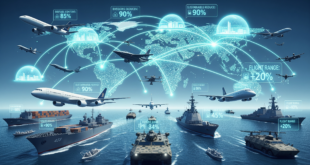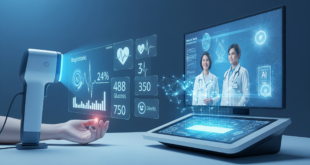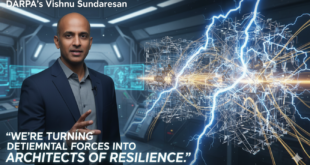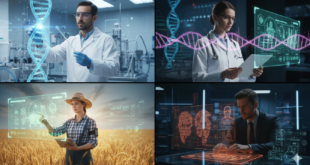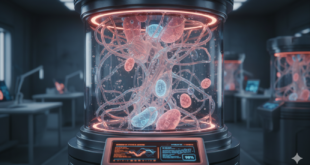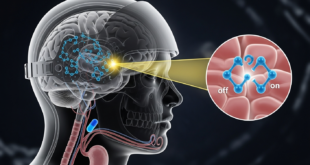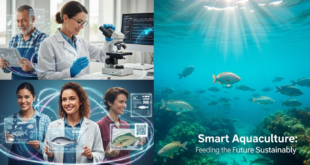Beyond Fossil Fuels: Synthetic Biology Redefines Military and Aviation Fuel How engineered microbes and biosynthetic fuels are powering a cleaner, smarter, and resilient future for defense and aviation The global aviation and defense industries face an urgent dual crisis: deep dependence on fossil fuels vulnerable to geopolitical shocks, and intensifying …
Read More »Illuminating Health: How Biophotonic Sensors Are Revolutionizing Medical Diagnostics
Illuminating Health: Biophotonic Sensors Transforming Medicine Through Light How photons are revolutionizing diagnostics — enabling faster, non-invasive, and intelligent healthcare powered by light. Biophotonic sensors and systems are rapidly transforming how we approach medical diagnostics, disease detection and biological research. These innovative optical devices offer real‑time, non‑invasive and highly sensitive …
Read More »DARPA’s MINT Revolution: Reinventing Solid-State Batteries and Military Materials
DARPA’s MINT Revolution: When Military Materials Learn to Heal Themselves Inspired by biology, DARPA’s MINT program is reengineering batteries and coatings to self-heal, adapt, and redefine military durability. Behind every modern military operation lie two persistent, underappreciated vulnerabilities: batteries that falter before the mission ends, and corrosion that quietly eats …
Read More »The DNA Revolution: How Genetic Technology is Reshaping Science, Medicine, and Forensics
The DNA Revolution: From Genes to Justice Uncover how DNA technology is revolutionizing medicine, agriculture, and forensic science. Introduction Deoxyribonucleic acid (DNA) is more than just a molecule—it is the very blueprint of life. Deoxyribonucleic acid (DNA) carries the biological instructions that make each species unique. Containing the biological instructions …
Read More »AI in Drug Discovery: Navigating the Promise of Breakthroughs and the Peril of Chemical Weapons
The field of artificial intelligence has made tremendous strides in drug discovery, offering the promise of revolutionizing medicine and healthcare. However, there is a growing concern that the same AI technology, when placed in the wrong hands, could be used to develop chemical weapons. This article explores two significant advancements …
Read More »Sensor Technologies Trends and Market Outlook: Shaping a Hyperconnected Future
The Sensor Revolution: A Market Overview A sensor is a device that can detect and respond to certain types of input from the physical environment. Motion, heat, pressure, light, moisture, or any other environmental phenomena could be the specific input. In an increasingly connected and intelligent world, sensor technologies serve as …
Read More »The Promise and Perils of Data-Driven Synthetic Biology
Data-Driven Synthetic Biology: When AI Begins to Design Life Itself AI and biology are merging to rewrite the code of life — promising breakthroughs in medicine, energy, and agriculture, but also raising profound ethical and security challenges. Introduction In recent years, synthetic biology has taken a quantum leap forward—thanks in …
Read More »The Future of Organ Transplantation: Synthetic Organs and the Road to Ending the Donor Crisis
Bioprinting Life: The Future of Organ Transplantation From 3D-printed organs to AI-powered tissue design, bioprinting is turning the science of healing into the art of creating life itself. The global organ shortage crisis is a stark and urgent reality. In the United States alone, more than 100,000 individuals are currently …
Read More »DARPA’s AWARE Program: A Leap Forward with Light Activated Drugs in Warfighter Alertness Post-Sleep Deprivation
DARPA’s AWARE Program: Light-Activated Drugs to Keep Warfighters Alert Without the Crash DARPA’s AWARE initiative pioneers photopharmacology—using near-infrared light to activate smart drugs that boost alertness on demand, redefining cognitive performance in defense and beyond. We’ve all experienced those grueling nights – facing a tight deadline, pulling an all-nighter, and …
Read More »Smart Aquaculture: Tackling the Global Challenge of Sustainable Fish Farming
Smart Aquaculture: AI, IoT, and Biotechnology Are Powering the Next Revolution in Sustainable Seafood AI-driven feeding, IoT sensors, and biotech breakthroughs are transforming aquaculture into a smarter, cleaner, and more sustainable system to feed the world’s future population. Introduction: The Rising Tide of Aquaculture Demand As the world’s population continues …
Read More » International Defense Security & Technology Your trusted Source for News, Research and Analysis
International Defense Security & Technology Your trusted Source for News, Research and Analysis
